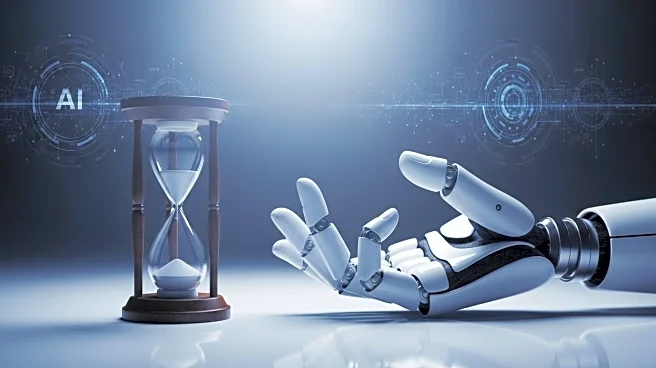What's Happening?
A recent survey conducted by the Society for Human Resource Management (SHRM) has revealed that while artificial intelligence (AI) is automating a significant portion of tasks in various job sectors, the actual displacement of jobs may not be as extensive as previously feared. The survey, which included responses from over 20,000 U.S. workers, found that 15.1% of jobs are at least 50% automated, and 7.8% are at least 50% done by generative AI. However, only about 6% of U.S. jobs are considered vulnerable to displacement. The survey highlights that nontechnical barriers, such as client preferences and regulatory requirements, play a significant role in preventing full automation of jobs. For instance, while computers can technically fly planes, passengers prefer having human pilots. Similarly, legal and regulatory constraints, as well as cost-effectiveness considerations, limit the extent of automation in various industries.
Why It's Important?
The findings of the SHRM survey are significant as they challenge the narrative that AI will lead to massive job losses. Instead, the survey suggests a more gradual transformation of the workplace, with AI complementing rather than replacing human workers. This has implications for workforce planning and policy-making, as it underscores the need for skills that AI cannot easily replicate, such as problem-solving and interpersonal skills. Industries that rely heavily on human interaction, like healthcare and personal services, are less likely to see job displacement, which could influence educational and training programs to focus more on these areas. The survey also highlights the importance of understanding nontechnical barriers to automation, which could inform future regulatory and business strategies.
What's Next?
As AI technology continues to evolve, businesses and policymakers will need to address the nontechnical barriers that limit automation. This could involve revisiting regulatory frameworks and considering the cost-benefit analysis of automation in different sectors. Additionally, there may be a growing emphasis on developing human skills that complement AI, such as emotional intelligence and creative problem-solving. Companies might also invest in reskilling programs to prepare their workforce for a future where AI plays a more prominent role. The healthcare industry, in particular, is expected to continue growing, driven by demographic changes and the need for human-centric services.
Beyond the Headlines
The survey's findings suggest a potential shift in the labor market, where the demand for technical skills may be balanced by a renewed focus on human-centric skills. This could lead to a reevaluation of educational priorities and workforce development strategies. Moreover, the ethical implications of AI in the workplace, such as privacy concerns and the impact on job satisfaction, may become more prominent as AI integration increases. The survey also raises questions about the role of AI in decision-making processes and the importance of maintaining human oversight in critical areas.










